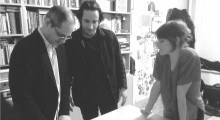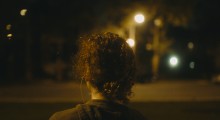Line Items
-
Digital Motion Picture Cameras in 2016: New Horizons

In this, my sixth annual camera round-up for Filmmaker, I’ll explore the latest developments and trends associated with cameras — as I have each year — which taken together continue to define new directions in digital cinema. I’ll highlight cameras that exemplify these trends. Those seeking an end-in-sight to a decade’s worth of profound change in camera technology might want to stop reading here. In my 2015 camera round-up, I touched on issues of design including modularity, new materials, a return to ergonomics; the birth of camera apps; wirelessness and the dawn of camera IP connectivity; the mirrorless revolution with […]
-
Act Naturally: Working with Caveh Zahedi on the Web Series, The Show about the Show

Caveh Zahedi played the same edit over and over, one too many times. “I think I’m gonna go, man,” I grumbled. I’d reached my breaking point. The idea of a rough cut that gets whittled down doesn’t work for Zahedi. He needs to sand, polish and lacquer each piece of wood before deciding if he even wants to use that wood. Basically, he fine-cuts each take. Why, I’ve asked countless times, can’t we just choose the best take and work it in? His answer: how can we tell what the best take is unless we see them all working at […]
-
Long-Term Care: How to Archive Your Film

Your film is done. Audiences have laughed and cried while watching it. You got a week-long run in New York and Los Angeles. Soon your aunt in Springfield will be able to watch it on Netflix and have a strained telephone conversation about how “interesting” it is. On to the next project! Not so fast. You need to archive your film now. Put down your storyboard for your next picture and help preserve your old one first. The Film Foundation estimates that “one half of all films made before 1950, and over 80 percent made before 1929 are lost forever.” […]
-
With an Eye on the Finish Line

We shot most of Channel B over a weekend, but it was only two weeks later, during an evening of pickups, that the aesthetic of the movie really started to come together. This probably happens a lot, especially on little rinky-dink shoots like ours. We were about to do a third take of one of our last setups, shooting in a public park, a few benches down from some drunks. I asked Cory Popp, our director of photography, to shift the first part of a camera movement just a little bit, and when I watched the playback on our one […]
-
How to Deliver Your Film to a Festival

Note (May 2018): the updated version of this article can be found here. Format. Codec. Audio. DCP. You’ve worked on your movie now for some time and have been eagerly waiting for acceptance emails from festivals. One lands in your inbox, and you excitedly read through the letter until, when you get to the festival’s technical requirements, you develop a sense of dread. The tersely worded communication from the technical director (glad we could finally meet) would put you to sleep if it didn’t terrify you. But don’t panic. Instead, phone your editor, and read this guide. Caveat emptor, though: […]
-
Pacing Myself: Henry Gamble’s Birthday Party Director Stephen Cone on Being His Own Editor

“Don’t you ever want an objective pair of eyes?” “Have you ever thought about working with an editor?” “Yes” and “yes” are the answers to questions asked of me and other filmmaker/editors over the years about this dual position, which, for either budgetary or artistic reasons, usually extends into self-music and postproduction supervision. Much like that against playwrights directing their own work, there is often a stigma against directors editing their own films, even as, in our ever-overcrowded filmmaking landscape, there are inevitably more filmmaker/editors, each with a mindset and motive different from the next. For some, it’s an easily […]
-
Stealing Thunder: How to Fight Piracy While Remaining Cool

If you’re like most young-ish filmmakers, you grew up and matured in an open source world of Napster, YouTube and BitTorrent. Whether it was making mixtapes for your college girlfriend, or ripping CDs and DVDs with your film school pals, “appropriating media” might have been a way of life for you to consume and share your favorite songs, films and TV. You scoffed at FBI warnings on VHS tapes and mocked MPAA PSAs. You’ve mashed up, mixed up and just plain stolen your way through the early 21st century with nary a tinge of regret. Hell, we’re living in an […]
-
Streaming for Dollars

Since the advent of YouTube and Vimeo, filmmakers have rolled the dice, releasing their shorts online for free in the hopes that their work will court the right set of eyeballs. Nowadays, even at banner institutions like The New York Times and The New Yorker, more and more curated short-form distribution opportunities are cropping up online that hint toward visibility and prestige for the films, along with, sometimes, financial returns for the filmmakers. Last December, The New Yorker introduced “The Screening Room,” a streaming platform where they rolled out three shorts acquired at the 2014 Sundance Film Festival: Person to […]
-
TV is Not the New Film

As much as I love Breaking Bad, The Wire, Mad Men and Twin Peaks, as great and as groundbreaking as those shows were, they still are not cinema. The recent explosion of quality long-form cable series has taken the TV form to a new level of artistry and craftsmanship. A show like Mad Men is not only thrilling because of its commentary on its era, but because of the zeitgeist energy created by everyone watching the show, talking about it and sharing opinions on social media. Today, perhaps more than ever, a new season of a quality show becomes a […]
-
Stream or Screen: Are Film Festivals Still Worth It for Short Films?

Before the advent of streaming platforms, the festival circuit was practically the only option for distributing short form content. You’d ship your finished film off to Sundance and pray for that acceptance letter — and maybe even a feature deal made at the festival. But while some of today’s filmmakers still hold tight to that romantic ideal, others are capitalizing on the visibility and fan cultivation teased by the online sphere. They argue against festival submission fees and pricey DCP shipments and for the simplicity of an online premiere on Vimeo, YouTube, NoBudge, Fandor or another platform where audiences are […]
